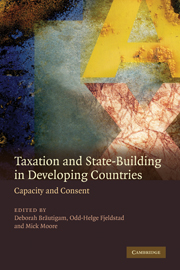Book contents
- Frontmatter
- Contents
- List of figures and tables
- List of contributors
- Acknowledgements
- 1 Introduction: taxation and state-building in developing countries
- 2 Between coercion and contract: competing narratives on taxation and governance
- 3 Capacity, consent and tax collection in post-communist states
- 4 Taxation and coercion in rural China
- 5 Mass taxation and state–society relations in East Africa
- 6 Contingent capacity: export taxation and state-building in Mauritius
- 7 Tax bargaining and nitrate exports: Chile 1880–1930
- 8 Associational taxation: a pathway into the informal sector?
- 9 Rethinking institutional capacity and tax regimes: the case of the Sino-Foreign Salt Inspectorate in Republican China
- 10 Tax reform and state-building in a globalised world
- References
- Index
1 - Introduction: taxation and state-building in developing countries
Published online by Cambridge University Press: 22 September 2009
- Frontmatter
- Contents
- List of figures and tables
- List of contributors
- Acknowledgements
- 1 Introduction: taxation and state-building in developing countries
- 2 Between coercion and contract: competing narratives on taxation and governance
- 3 Capacity, consent and tax collection in post-communist states
- 4 Taxation and coercion in rural China
- 5 Mass taxation and state–society relations in East Africa
- 6 Contingent capacity: export taxation and state-building in Mauritius
- 7 Tax bargaining and nitrate exports: Chile 1880–1930
- 8 Associational taxation: a pathway into the informal sector?
- 9 Rethinking institutional capacity and tax regimes: the case of the Sino-Foreign Salt Inspectorate in Republican China
- 10 Tax reform and state-building in a globalised world
- References
- Index
Summary
Introduction
Taxation is the new frontier for those concerned with state-building in developing countries. ‘The history of state revenue production’, as Margaret Levi declared, ‘is the history of the evolution of the state’ (1988: 1). Taxes underwrite the capacity of states to carry out their goals; they form one of the central arenas for the conduct of state–society relations, and they shape the balance between accumulation and redistribution that gives states their social character. Without the ability to raise revenues effectively, states are limited in the extent to which they can provide security, meet basic needs or foster economic development. Yet the political importance of taxation extends beyond the raising of revenue. We argue in this book that taxation may play the central role in building and sustaining the power of states, and shaping their ties to society. The state-building role of taxation can be seen in two principal areas: the rise of a social contract based on bargaining around tax, and the institution-building stimulus provided by the revenue imperative. Progress in the first area may foster representative democracy. Progress in the second area strengthens state capacity. Both have the potential to bolster the legitimacy of the state and enhance accountability between the state and its citizens.
- Type
- Chapter
- Information
- Taxation and State-Building in Developing CountriesCapacity and Consent, pp. 1 - 33Publisher: Cambridge University PressPrint publication year: 2008
- 41
- Cited by



